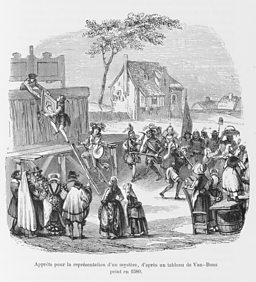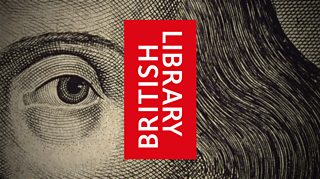Shakespeare at the Fair
Victorian fairs often hosted pop-up theatres, which didn't require licences, and in which Shakespeare was performed as part of a rich mix of entertainment!
While Shakespeare was mainly performed in traditional theatres, it was also staged in less conventional settings. Fairs often hosted theatres, which didn’t require licensing, and Shakespeare was performed as part of a repertoire that included melodramas, burlesques, ballets, farces, nautical pieces, war spectacles and dog dramas featuring real canines!
-
![]()
Much ado near me
Hear more Shakespeare stories on BBC Radio Leeds
-
![]()
Shakespeare Festival 2016
The BBC celebrates the genius of the bard

Shakespeare and the Victorian portable theatres
The author Josephine Harrop is one of the few to have researched the history of the travelling theatres. In her book Victorian Portable Theatres she documents the 19th century phenomenon from the 1800s, with their heyday during the reign of Queen Victoria to their gradual disappearance in the early decades of the twentieth century. These travelling theatre companies trundled along the highways of England with wagons stacked with everything from a portable booth theatre to scenery, props and costumes.
Shortened performances of Shakespeare were performed many times at these fairs and extracts worked as a “trailer” for the main show in the booth.
-
![]()
Shakespeare Lives
The nation’s greatest performing arts institutions mark 400 years since the Bard's death
Related Links

...barbarously murdered for the gratification of early risers at least five and twenty times before breakfast
These were repeated as frequently as possible from dawn till nightfall - one critic refers to Hamlet and Othello being “barbarously murdered for the gratification of early risers at least five and twenty times before breakfast.” On the whole standards were not high – for performers and spectators. Writers such as Dickens found this form of entertainment “quaint.”
Sam Wild's Company
Travelling theatres did not restrict their business to fairs. Companies could arrive several days before the fair and stay on for several days afterwards. Outside of fair days and in winter seasons full length dramas were presented. Sam Wild’s company spent more time presenting original dramas to staging shorter versions and had higher “production values” than others. There were daily rehearsals, a named producer or stage manager (a role Sam took on), and attention paid to costumes and scenery.
Hamlet, Macbeth, Othello and Richard the Third were the favoured quartet
It had ten Shakespeare plays in its repertoire but only four were regularly performed: Hamlet, Macbeth, Othello and Richard III were the favoured quartet. Although these were full-length productions, they were popular adaptations of the period with action favoured over the words, as well as singing and dancing. Also, Shakespeare took his turn alongside popular dramas of the day, as this report in Era of 6 May 1849 shows:
“On Friday Richard III, Mr Holloway’s Richard was a powerful delineation. On Monday and Tuesday was performed “My Poor Dog Tray; or, The Idiot of the Shannon” Mr Bateson as Darby Sullivan was exceedingly droll and played and sang admirably. Mr S Wild’s dog, Nelson, surpassed anything of the kind hitherto witnessed on these boards.”
Mr Thorne’s travelling theatre spent a summer season at North Shields in 1845. Shakespeare was presented regularly but there were no guest stars or special occasions, which suggests that there was a strong leading man well versed in Shakespeare.
About Shakespeare on Tour
From the moment they were written through to the present day, Shakespeare’s plays have continued to enthral and inspire audiences. They’ve been performed in venues big and small – including inns, private houses and emerging provincial theatres.

BBC English Regions is building a digital picture which tracks some of the many iconic moments across the country as we follow the ‘explosion’ in the performance of The Bard’s plays, from his own lifetime to recent times.
Drawing on fascinating new research from Records of Early English Drama (REED), plus the British Library's extensive collection of playbills, as well as expertise from De Montfort University and the Arts and Humanities Research Council, Shakespeare on Tour is a unique timeline of iconic moments of those performances, starting with his own troupe of actors, to highlights from more recent times. Listen out for stories on Shakespeare’s legacy on your BBC Local Radio station from Monday 21 March, 2016.
You never know - you might find evidence of Shakespeare’s footsteps close to home…
Craig Henderson, BBC English Regions
Shakespeare on Tour: Around Leeds
-
![]()
Mrs Nunn plays Hamlet in Yorkshire
Female Hamlets are nothing new, from Sarah Siddons to Maxine Peake
Shakespeare on Tour: Around the country
-
![]()
Whitby, wealth and a Shakespearean bachelor night
The Bachelors of Whitby sponsor a performance of Merchant Of Venice
-
![]()
A new king and rebranded Shakespeare’s players head first for Shrewsbury
James I established the ‘King’s Men’ as his official group of theatre players
-
![]()
Shakespeare's men perform before the King at Wilton in Salisbury
A royal audience in Salisbury
-
![]()
Caludon Castle: Did Shakespeare perform here for ‘Henry the Harmless’?
Was Shakespeare there during the 1593 'Plague Tour'?








